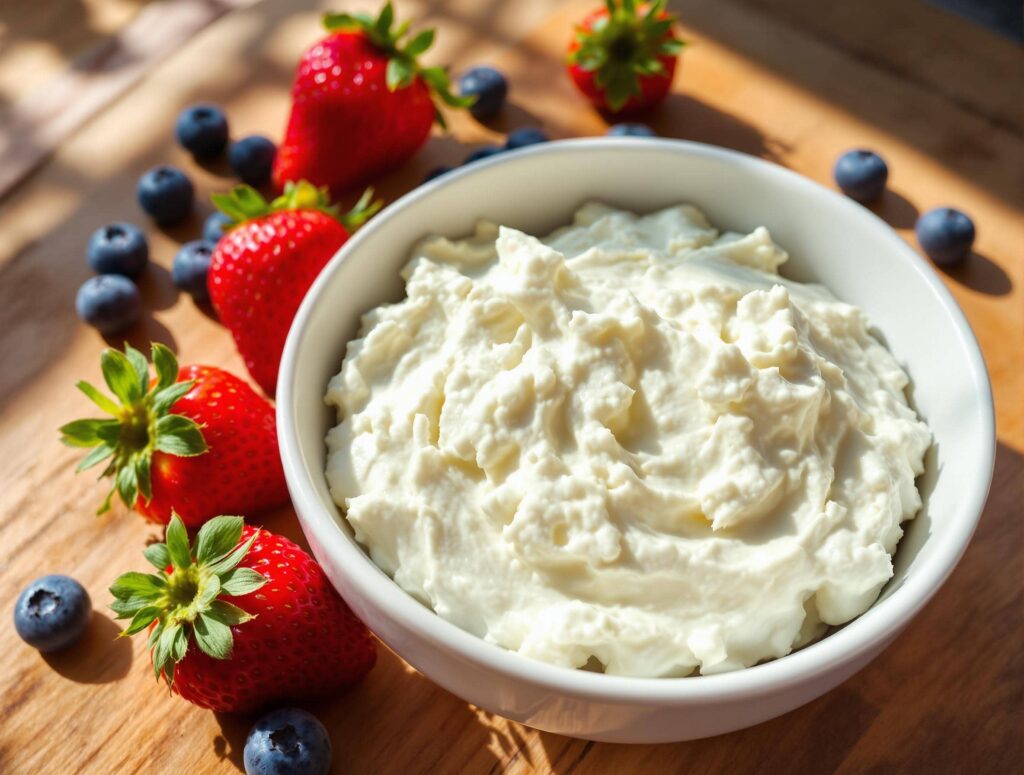Cottage cheese is a versatile and nutritious food loved by many for its creamy texture and mild flavor. But how many times a week should you eat cottage cheese to fully enjoy its health benefits? Packed with protein, calcium, and other essential nutrients, it’s a favorite among health enthusiasts and those looking to maintain a balanced diet.
In this article, we’ll explore the nutritional benefits of cottage cheese, its impact on your health, and how often you should include it in your diet for optimal results. Whether you’re aiming for weight loss, muscle gain, or simply a healthier lifestyle, cottage cheese can be a valuable addition to your meal plan.
Table of Contents
Nutritional Benefits of Cottage Cheese
Cottage cheese is often hailed as a nutritional powerhouse. Here’s a closer look at the nutrients it provides:
- High-Quality Protein: Cottage cheese is rich in casein, a slow-digesting protein that helps with muscle repair and keeps you feeling full for longer.
- Calcium for Strong Bones: A single serving contains a good amount of calcium, which is essential for bone health and teeth strength.
- Low in Calories: Depending on the fat content, cottage cheese is a low-calorie option, making it a great snack or meal addition.
- Rich in Vitamins and Minerals: Cottage cheese offers B vitamins, phosphorus, selenium, and magnesium, all of which play crucial roles in maintaining overall health.
Thanks to this impressive nutritional profile, cottage cheese can fit seamlessly into various diets, from low-carb to high-protein plans.
Health Advantages of Cottage Cheese
Eating cottage cheese regularly comes with several health benefits:
- Supports Weight Management
Cottage cheese is filling and low in calories, making it an excellent choice for those looking to shed or maintain weight. Its high protein content helps control hunger, reducing the chances of overeating. - Promotes Muscle Growth
Athletes and fitness enthusiasts often include cottage cheese in their diets because of its protein content. The slow-release protein is perfect for muscle recovery and growth, especially after workouts. - Boosts Bone Health
Calcium and phosphorus are vital for bone density and strength, and cottage cheese delivers both in significant amounts. Regular consumption can reduce the risk of osteoporosis. - Good for Gut Health
Some types of cottage cheese contain probiotics, which can support a healthy gut microbiome.
How Often Should You Eat Cottage Cheese?
The frequency with which you should eat cottage cheese depends on your personal health goals, dietary needs, and preferences. Here’s a breakdown of how often is ideal for various scenarios:
- For General Health
If you’re looking to maintain overall health and balance in your diet, consuming cottage cheese 2–3 times a week is a good starting point. This allows you to benefit from its protein, calcium, and other nutrients without over-relying on it. - For Weight Loss
If weight management is your goal, cottage cheese can be a great snack or meal addition 3–4 times a week. Its high protein and low-calorie content make it an excellent substitute for higher-calorie foods, keeping you full and satisfied. Pair it with fruits or vegetables for a balanced snack. - For Muscle Building
Athletes and fitness enthusiasts may benefit from eating cottage cheese more frequently—up to 5 times a week. Its slow-digesting protein makes it a perfect post-workout snack or even a nighttime option to support muscle repair while you sleep. - Daily Consumption
While eating cottage cheese daily isn’t harmful for most people, moderation is key. Eating it every day might lead to excessive sodium intake, depending on the brand. To keep it safe, opt for low-sodium varieties and stick to one serving per day.
Portion Control Matters

Even if you eat cottage cheese multiple times a week, portion sizes are important. A single serving (about ½ cup or 100 grams) provides a good balance of nutrients without overloading on calories or sodium. If you’re consuming it more frequently, adjust portion sizes to fit your overall calorie and nutrient intake.
Consider Individual Dietary Needs
- Lactose Intolerance: If you’re sensitive to lactose, look for lactose-free options or limit your intake to occasional servings.
- Sodium Content: Some cottage cheese brands are high in sodium. If you’re watching your sodium intake, choose low-sodium or no-salt-added varieties.
Including cottage cheese in your diet a few times a week can provide its health benefits while allowing room for variety in your meals. Balance is key, as over-reliance on any single food can lead to nutritional gaps.
Factors to Consider When Eating Cottage Cheese
Before deciding how often to include cottage cheese in your diet, it’s important to consider a few key factors. These can help you make the best choice for your health and lifestyle.
- Lactose Intolerance or Sensitivity
Cottage cheese contains lactose, a natural sugar found in dairy. While it has less lactose than milk, those who are lactose intolerant might still experience discomfort after eating it. If this applies to you, consider lactose-free versions, which are now widely available. - Sodium Content
Many cottage cheese brands are high in sodium, which can lead to water retention and elevated blood pressure if consumed in large amounts. If you’re concerned about sodium, choose a low-sodium variety or limit your serving size. The recommended daily sodium intake is around 2,300 milligrams, and some cottage cheese brands contain up to 400 milligrams per serving. - Fat Content
Cottage cheese comes in different fat levels, ranging from full-fat to fat-free. Full-fat versions provide more calories and may not fit into calorie-restricted diets, while fat-free versions are lighter but may lack some of the creamy texture people enjoy. Choose the version that best suits your dietary goals. - Allergies
People with a dairy allergy should avoid cottage cheese entirely, as it is made from milk and can trigger allergic reactions. - Portion Sizes
Overeating cottage cheese can lead to excess calorie or sodium intake, even though it is generally considered a healthy food. Sticking to a standard serving size of about ½ cup ensures you get the benefits without overindulging. - Dietary Variety
While cottage cheese is nutritious, eating a variety of foods ensures you get all the vitamins, minerals, and nutrients your body needs. Balance it with other protein sources like eggs, chicken, fish, or plant-based options like tofu and beans.
Who Should Eat Cottage Cheese Regularly?
- Athletes: Its high protein content makes it an excellent post-workout option.
- People Watching Their Weight: Cottage cheese is filling and low-calorie, ideal for those aiming to lose weight.
- Older Adults: Its calcium and phosphorus can support bone health and help prevent osteoporosis.
- Busy Individuals: Quick and easy to prepare, cottage cheese is perfect for those with a hectic schedule.
By considering these factors, you can decide how often cottage cheese fits into your routine. Up next, we’ll explore creative and delicious ways to enjoy it in your meals!
Creative and Delicious Ways to Enjoy Cottage Cheese

Cottage cheese is not only nutritious but also incredibly versatile. Whether you’re having it as a snack, a side dish, or part of a main meal, there are endless ways to make it exciting and flavorful. Here are some simple and delicious ideas:
Sweet Options
If you have a sweet tooth, these combinations can transform cottage cheese into a delightful treat:
- With Fresh Fruits: Pair it with sliced bananas, strawberries, blueberries, or peaches for a refreshing and naturally sweet snack.
- Drizzle of Honey or Maple Syrup: Add a touch of sweetness with a drizzle of honey or maple syrup. This works well for breakfast or dessert.
- Cinnamon and Apples: Sprinkle cinnamon over cottage cheese and pair it with chopped apples for a comforting snack.
- Smoothie Booster: Blend cottage cheese into a fruit smoothie for an extra protein boost and a creamy texture.
Savory Twists
Prefer savory flavors? These options are perfect for you:
As a Meal Ingredient
Cottage cheese can also be a key ingredient in more elaborate dishes:
- Pancakes or Waffles: Mix it into your pancake or waffle batter for added protein and a fluffier texture.
- Lasagna: Substitute cottage cheese for ricotta in lasagna for a lighter, protein-packed version of this classic dish.
- Scrambled Eggs: Stir cottage cheese into scrambled eggs while cooking for a creamier consistency and extra protein.
- Smooth Dips: Blend cottage cheese with garlic, herbs, and olive oil to create a savory dip for veggies or crackers.
Snack on Its Own
If you’re short on time, cottage cheese is satisfying enough to enjoy on its own. Sprinkle it with some nuts, seeds, or spices for added texture and flavor.
Quick Tips for Cooking with Cottage Cheese
- Experiment with Herbs and Spices: Dill, parsley, chives, and black pepper can elevate its flavor.
- Pair with Whole Grains: Cottage cheese goes well with quinoa, brown rice, or even whole-grain pasta.
- Bake It: Use it in baked dishes like muffins or casseroles for a rich and creamy texture.
These creative ideas make it easy to incorporate cottage cheese into your meals throughout the week. Up next, let’s tackle some of the most frequently asked questions about eating cottage cheese!
you might also like:
Cottage cheese is not only nutritious but also incredibly versatile, making it a perfect ingredient for countless recipes. Whether you’re looking for a quick snack or a hearty meal, you can explore a variety of cottage cheese recipes to suit your taste. For those with a sweet tooth, consider pairing your cottage cheese with delightful treats like blueberry coffee cake or banana bread cookies for a balanced and satisfying experience. These options bring together the best of flavor and health, giving you plenty of delicious ways to enjoy cottage cheese in your daily routine.
Frequently Asked Questions About Eating Cottage Cheese
Cottage cheese is a popular food, but many people have questions about its benefits, uses, and how often it should be consumed. Here are some of the most common questions answered:
1. Can you eat cottage cheese every day?
Yes, you can eat cottage cheese daily as long as it fits into your overall diet and you are mindful of portion sizes. However, if you have concerns about sodium or lactose, it’s better to limit it to a few times a week and choose low-sodium or lactose-free options.
2. Is cottage cheese good for weight loss?
Absolutely! Cottage cheese is high in protein and low in calories, making it an ideal food for weight loss. It keeps you full for longer, reducing the urge to snack between meals. Pair it with fruits or vegetables for a balanced and satisfying snack.
3. How much cottage cheese should I eat in a day?
A standard serving size is about ½ cup (100 grams). This is enough to provide a good amount of protein, calcium, and other nutrients without excessive calories or sodium. If you eat it daily, stick to one serving per day.
4. Is it okay to eat cottage cheese at night?
Yes, cottage cheese is an excellent choice for a nighttime snack. Its slow-digesting protein (casein) helps repair and build muscles while you sleep, making it especially beneficial for athletes and fitness enthusiasts.
5. Can lactose-intolerant people eat cottage cheese?
Some people with lactose intolerance can tolerate small amounts of cottage cheese, but others may experience discomfort. For those sensitive to lactose, lactose-free versions are a great alternative. Always consult with a doctor if you’re unsure.
6. Is cottage cheese a good source of probiotics?
Not all cottage cheese contains probiotics. If you’re looking for gut-friendly benefits, check the label to ensure the brand includes live and active cultures.
7. What are the best brands of cottage cheese?
While preferences vary, some popular cottage cheese brands known for quality and flavor include Daisy, Hood, and Good Culture. Look for options with minimal additives and low sodium if health is your priority.
8. Can I eat cottage cheese if I have high blood pressure?
Yes, but choose low-sodium or no-salt-added varieties. Cottage cheese can be high in sodium, which may not be ideal for managing high blood pressure.
9. Is cottage cheese better than yogurt?
Both are nutritious, but cottage cheese offers more protein, while yogurt often contains probiotics for gut health. The better choice depends on your dietary goals. For muscle building, cottage cheese is ideal; for gut health, yogurt may be better.
10. Can children eat cottage cheese?
Yes, cottage cheese is safe and healthy for children. It’s a great source of calcium and protein for growing kids. Just make sure to watch the sodium content and serve it in appropriate portions.
Conclusion
Cottage cheese is a nutritious and versatile food that fits well into various dietary plans. While it can be eaten daily in moderation, consuming it 2–4 times a week is often sufficient to enjoy its health benefits without overdoing it. Keep in mind factors like sodium levels, lactose sensitivity, and portion sizes when incorporating it into your meals.
Whether you’re looking to lose weight, build muscle, or simply maintain a balanced diet, cottage cheese is a convenient and delicious option. Pair it with fruits, vegetables, or whole grains for endless meal possibilities, and enjoy the journey to better health!

